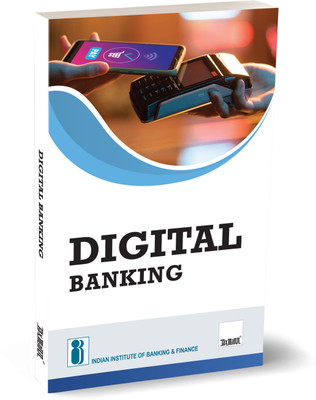Iibf X Taxmann's Digital Banking(English, Paperback, unknown)
Quick Overview
Product Price Comparison
This book provides a seminal guide that charts the transformative journey of the banking sector in the digital age. It discusses the rise of digital banking, innovative financial products like UPI BHIM, and the role of Fintechs and NBFCs in enhancing financial inclusion and accessibility. The book provides in-depth insights into new banking trends like Blockchain and AI and offers practical knowledge for banking professionals to adapt to this evolving digital landscape. It serves as an essential resource, covering the following broad topics: (i) Digital Banking Products (ii) Digital Banking & Financial Inclusion (FI) (iii) Marketing of Digital Banking Products (iv) Payment Systems (v) Future Trends in Digital Banking An invaluable resource for students, professionals, and anyone keen on understanding the digital banking revolution. The Present Publication is the 2024 Edition, updated by Mr Burra Butchi Babu | Former General Manager ŌĆō Bank of India and vetted by Mr V.A. Prasanth | Former General Manager & Chief Information Officer ŌĆō Indian Bank. Taxmann exclusively publishes this book for the Indian Institute of Banking and Finance with the following coverage: (vi) Module A ŌĆō Digital Banking Products (a) Digital Delivery Channels (1) Introduction and need for digital channels in banking (2) Analyzing the cost of transactions and customer preferences (3) The role of technology in enhancing user-friendliness and customer interaction (4) Emphasizing security as a crucial aspect of digital banking, including information security (5) Overview of the Integrated Ombudsman Scheme, 2021 by RBI (6) Discussion on customer protection and limiting liability in unauthorized transactions (7) RBI's directions on digital payment security controls (8) Challenges faced in digital banking and the concept of e-KYC (b) Cards (1) History and overview of plastic payment cards (2) Features and benefits of cards for customers (3) Understanding the Payment Card Industry-Data Security Standard (4) Comparison between Magnetic Strip Cards and EMV Cards, including NFC-based Tap & Go technology (5) The approval process for card schemes and profitability aspects (6) Insight into backend operations, recovery, follow-up, and information security issues (c) Automated Teller Machines (ATMs) (1) History and product features of ATMs (2) Types of ATMs, including White Label and Brown Label (3) The functioning of ATM networks and Instant Money Transfer (IMT) systems (4) Discussing profitability, risk management, and frauds in ATM operations (5) Backend operations and technology in ATMs (6) Overview of the Dispute Management System (DMS) (d) Mobile Banking (1) Introduction and diverse features of mobile banking (2) Description of IMPS and its benefits (3) Discussion on risk management, frauds, backend operations, and information security tips in mobile banking (e) Internet or Online Banking (1) History, working, and features of Internet banking (2) Analysis of the profitability and risks associated with Internet banking (f) POS Terminals (1) Background and features of Point of Sale (POS) systems (2) Benefits of POS systems to merchants and customers (3) Different types of transactions and the cash withdrawal process at POS (4) Merchant onboarding, approval process, and the parties involved in a POS setup (5) Profitability analysis and risk management in POS operations (vii) Module B ŌĆō Digital Banking & Financial Inclusion (FI) (I) Introduction to financial inclusion and its strategies (II) Approaches to accelerate financial inclusion and the role of technologies (III) Digital banking services in financial inclusion and factors beyond technology (IV) Information security issues in financial inclusion and new developments (V) Understanding how banks earn money using digital delivery channels (viii) Module C ŌĆō Marketing of Digital Banking Products (I) Concept and channels for marketing digital banking products (II) Product planning and marketing structure in banks (III) Sales delivery, e-galleries, and after-sales service to customers (IV) Marketing strategies for financial inclusion and the dangers of mis-selling (V) Use of analytics in marketing and customer education and protection (ix) Module D ŌĆō Payment Systems (I) Overview of global and domestic payment systems (II) Introduction to new domestic payment vehicles and platforms (III) Detailed analysis of various systems like Cheque Truncation System (CTS), RTGS, NEFT, NETC, Bharat QR, UPI QR, BBPS, and SWIFT (IV) Forex and securities settlements (V) Innovative banking and payment systems, including digital banking super apps (x) Module E ŌĆō Future Trends in Digital Banking (I) Background and future trends in digital banking (II) The impact of fintech, business ecosystem, and blockchain technology (III) Discussion on cryptocurrencies, peer financing, cloud computing, and virtualization (IV) Data analytics, artificial intelligence (AI), machine learning (ML), deep learning (DL), robotic process automation (RPA), and the Internet of Things (IoT) (V) Central Bank Digital Currency (CBDC) and digital transformation of banks in India


